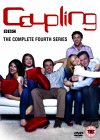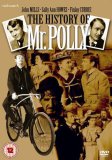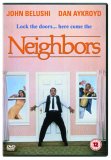 Coupling: Complete Series 3 | DVD | (22/09/2003)
from £4.89
| Saving you £15.10 (308.79%)
| RRP
Coupling: Complete Series 3 | DVD | (22/09/2003)
from £4.89
| Saving you £15.10 (308.79%)
| RRP The third series of Coupling, first aired in 2002, takes fans of the BBC's comedy of sex, manners and modern relationships into new realms of engaging surrealism, leaving those irritating comparisons with Friends trailing in its wake. The men are constantly in pursuit of a basic grasp of the "emotional things" that make women behave the way they do. The women analyse everything to death. But thanks to Steve Moffat's scripts, tighter and quirkier than ever, these characters are living, breathing human beings rather than cynical ciphers for comedy stereotypes. The performances are as strong as you'd expect from an established team, with actors such as Jack Davenport (the ever-perplexed Steve), Ben Miles (unreconstructed chauvinist Patrick), Sally Alexander (dryly intelligent Susan) and Kate Isitt (neurotic Sally) wearing their roles like second skins. But in the surreal stakes, it's Richard Coyle as Jeff, wondering aloud what happens to jelly after women have finished wrestling in it, and Gina Bellman as Jane, musing on the importance of a first snog in identifying what men like to eat, who really raise the laughter levels. All things considered, this is superior comedy for all thirtysomethings--genuine and putative. --Piers Ford
 Coupling: Complete Series 4 | DVD | (16/08/2004)
from £8.55
| Saving you £11.44 (133.80%)
| RRP
Coupling: Complete Series 4 | DVD | (16/08/2004)
from £8.55
| Saving you £11.44 (133.80%)
| RRP Coupling Season 4: feel free to insert your own "four-play" joke, or for that matter, your own "insert" joke. Sex is still topic 1 for the intertwined group of "exes and best friends", but in this pivotal season there are momentous "relationship issues" that will upend all their lives (insert your own "upend" joke while you're at it). Susan is pregnant, inspiring in Steve nightmares about his own execution and unflattering comparisons of the birth process to John Hurt's iconic gut-busting scene in Alien. Missing in action is the Kramer-esque Jeff (although he makes something of a return in the season finale). Joining the ensemble is Oliver, who is more in the Chandler mode as a lovable loser with the ladies. These inevitable comparisons to "Sein-Friends" are no doubt heresy to Coupling's most devoted viewers. Indeed, this series does benefit from creator and sole writer Steven Moffat's comic voice and vision. He provides his ever-game cast some witty, funny-cause-it's-true dialogue, as in Oliver's observation that "Tea isn't compatible with porn". This Britcom is also less inhibited in language and sexual situations than its American counterparts. In the cleverly-constructed opening episode, in which the same "9-1/2 Minutes" are witnessed from three different perspectives, Sally and Jane can do what was left to the imagination when Monica and Rachel offered to make out in front of Joey and Chandler. The birth of Susan and Steven's baby ends the six-episode season on a satisfying and surprisingly moving grace note. A bonus disc takes viewers behind the scenes with segments devoted to bloopers and interviews with cast and crew. --Donald Liebenson
 Coupling: Complete Series 2 | DVD | (23/09/2002)
from £6.15
| Saving you £13.84 (225.04%)
| RRP
Coupling: Complete Series 2 | DVD | (23/09/2002)
from £6.15
| Saving you £13.84 (225.04%)
| RRP Steven Moffat's second series of Coupling, first broadcast in 2001, is a brilliant consolidation of all those neuroses, small deceits, obsessions and personality tics that struck such a resonant chord when Steve, Susan and their four friends were first unleashed on us. Comparisons with Friends itself are tiresome and lazy: Coupling is an intrinsically British comedy that picks apart the trivial and the mundane in everyday relationships and takes them on surreal journeys, leaving the participants hilariously bemused and rarely any wiser. Its success is due to the magical combination of Moffat's very funny scripts and the talents of six extremely likable actors, including Jack Davenport (Steve) and Sarah Alexander (Susan). But it's Richard Coyle's Jeff, whose sexual fantasies and putting-your-his-in-it propensities exert a compelling fascination, who really keeps you watching through your fingers as you hold your hands to your face in disbelief. Breasts, bottoms and pants are the basis for most of the conversational analysis when these friends get together as a group, as couples, as girlfriends or as mates, invariably becoming metaphors for the state of a relationship or situation. Individual viewpoints and terrors are explored through respective memories of the same event and what-if scenarios. Chain reactions inevitably ensue, fuelling comedy that is based almost entirely on misunderstanding. On the DVD: Coupling, Series 2 on disc is presented in 16:9 anamorphic video aspect ratio, together with a crisp Dolby Digital stereo soundtrack; Mari Wilson's sensuous version of "Perhaps, Perhaps, Perhaps" for the theme tune deserves a special mention. Extras include disappointing interviews with writer Steven Moffat and Jack Davenport, which are mainly an excuse to repeat several major scenes from the series in full. The "Behind the scenes" feature is also a let-down: it's just a not very funny record of a cast photo shoot. --Piers Ford
 The History Of Mr Polly | DVD | (14/05/2007)
from £11.98
| Saving you £10.00 (100.10%)
| RRP
The History Of Mr Polly | DVD | (14/05/2007)
from £11.98
| Saving you £10.00 (100.10%)
| RRP Lee Evans stars in this television adaptation of the H.G. Wells classic in which a humble draper's assistant grows tired of his life and takes to the road
 Coupling: Complete Series 1 | DVD | (17/09/2001)
from £11.98
| Saving you £8.01 (66.86%)
| RRP
Coupling: Complete Series 1 | DVD | (17/09/2001)
from £11.98
| Saving you £8.01 (66.86%)
| RRP Coupling is a witty, instantly addictive series that charts the tangled sex lives of a close-knit group comprising "exes and best friends": womaniser Jack, hapless nice guy Steve, "strange and disturbing" Jeff, uninhibited Susan, neurotic Sally and manipulative Jane. The obvious frame of reference is Friends (Steve and Susan are the Ross and Rachel equivalent), but this series also echoes Seinfeld in its coinage of catchphrases and plot lines (in episode one, Steve tries to dump Jane, who refuses to accept). But it's no mere British clone of US sitcoms: Coupling has its own fresh and provocative take on relationships. At one point, a furious Susan discovers that Patrick not only had a videotape of the former couple having sex, but that he also taped over her. --Donald Liebenson
![Beethoven: Fidelio [1991]](/pictures/1028788.jpg) Beethoven: Fidelio | DVD | (31/07/2000)
from £N/A
| Saving you £N/A (N/A%)
| RRP
Beethoven: Fidelio | DVD | (31/07/2000)
from £N/A
| Saving you £N/A (N/A%)
| RRP Beethoven's lone opera Fidelio had a troubled gestation, as its no fewer than four overtures suggest. The finished product, while obviously a work of genius, exposes its patchwork qualities even in the best of productions. Luckily, the 1991 staging by the Royal Opera, Covent Garden, is so lucid and intelligent that the opera--a forceful plea for freedom, even in the most severely dictatorial regimes--comes across as both a forceful drama and a thought-provoking "message".Stage director Adolf Dresen, together with set designer Margit Bardy and lighting designer Erich Falk, presents the characters (which on paper have a tendency to remain "types") as fully human, their interactions made understandable and plausible not only by Beethoven's humanising music but also the realistic period settings. Video director Derek Bailey has succeeded admirably at getting this across for the home viewer as well. Musically, this Fidelio is a whirlwind, with conductor Christoph von Dohnányi leading the Orchestra of the Royal Opera House and the Royal Opera Chorus in an energetic but never too-fast performance (by the way, they perform the fourth overture); and the singers are top-notch vocally and dramatically. Soprano Gabriela Benacková makes an arresting, emotionally complex Leonore, and Josef Protschka as her imprisoned husband, Florestan, brings down the house with his impassioned aria at the beginning of Act II. --Kevin Filipski, Amazon.com
![Variety Jubliee [DVD]](/pictures/1111826.jpg) Variety Jubliee | DVD | (28/11/2011)
from £12.98
| Saving you £0.01 (0.08%)
| RRP
Variety Jubliee | DVD | (28/11/2011)
from £12.98
| Saving you £0.01 (0.08%)
| RRP Kit (Ellis Irving) and Joe Swan (Reginald Purdell) are variety stars at the turn of the century. Kits son is killed in the First World War but the sons' son carries on the family tradition by reviving the music hall and joining the RAF musical. This domestic melodrama chronicles three generations of a family of music-hall owners. When WWII erupts, the popularity of the music halls decline, and the Burns and Swann music hall falls into disrepair. Their business falls further into decline when Kit and Evelyn's son, Kit Jr., is killed. Unable to revive their theatre, Kit and Evelyn die in poverty and Swann ends as the theatre doorman. Fortunately, Kit senior's grandson, also named Kit, decides to save and run the hall. He does so until he joins the RAF to fight in WWII.
 Neighbours | DVD | (17/01/2005)
from £17.53
| Saving you £-4.54 (N/A%)
| RRP
Neighbours | DVD | (17/01/2005)
from £17.53
| Saving you £-4.54 (N/A%)
| RRP Ricky Tomlinson and Phil Daniels star in this dark new British comedy about two neighbours whose disagreements soon escalate.
![The Wolves Of Kromer [1998]](/pictures/1019445.jpg) The Wolves Of Kromer | DVD | (10/02/2003)
from £7.90
| Saving you £5.09 (39.20%)
| RRP
The Wolves Of Kromer | DVD | (10/02/2003)
from £7.90
| Saving you £5.09 (39.20%)
| RRP In a small British town Seth and Gabriel are gay in love and werewolves. While their lunar lycanthropic secret remains hidden the townspeople begin to sense that these two young men are very different in many ways indeed...

Please wait. Loading...
This site uses cookies.
More details in our privacy policy